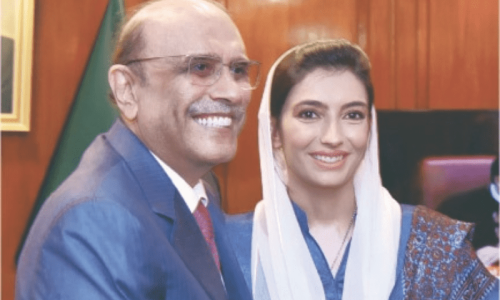WASHINGTON, Oct 18: Civilians elected with the help of a military government are usually those who either cannot be elected on their own or have ‘some skeletons’ to hide, says Lt. Gen. Asad Durrani, former ISI chief.
But a military government is forced to create this ‘civilian façade’ to legitimise the takeover, said Mr Durrani while expressing his views on “Disengaging military from politics” at Washington’s Carnegie Endowment for International Peace.
“Some of those politicians who become part of this façade have a murky background. Some cannot win elections on their own. Some have skeletons to hide. Some do it for benefits,” he said.
According to him, the biggest question confronting a military ruler is: “I am in power, now I must also have legitimacy.” In Pakistan, he said, this legitimacy is acquired through courts and after some time “efforts are made to get some politicians on board.”
Explaining Pakistan’s failure to have a stable political government, the former ISI chief quoted former President Ghulam Ishaq as saying: “We people get impatient.”
He said: “Politicians only learn at the cost of the country. They make mistakes but this is the only process.”
But these mistakes are viewed differently in the military “where people start saying we cannot afford these mistakes,” he said. The military, however, only takes over when there’s a general resentment against the government and “they know that the takeover will be generally accepted,” he added.
Talking about the thought process that guides a military government, he said: After the takeover, the military government believes that things will be OK in a couple of years but they don’t. The government, however, comes with an agenda and believes that if implemented, this agenda will pull the country out of its troubles.
The situation begins to deteriorate and the ire gets directed at the military. The politicians chosen to support the military also become unpopular and there comes a time when “you realise if you want your group to win, you must rig the elections”.
Meanwhile, a military ruler’s agenda of “cleaning up the political mess” prevents him from “getting off the tiger”. Thus the military government “keeps digging deeper into the hole.”
The general then used an Urdu idiom to describe the situation: “Main kambal ko chorta hoon, kambal mujhey naheen chorta.”
This situation, said the general, is very painful for the military, which “as an institution wants to stay out of politics.”
The military’s meddling in politics, he said, affects “the normal flow in the higher ranks” and ultimately “loyalty to the coup makers also peters off”.














































Dear visitor, the comments section is undergoing an overhaul and will return soon.